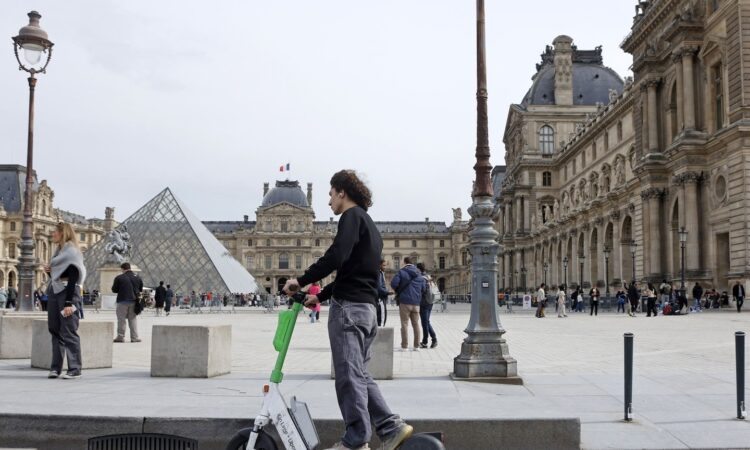
So I wasn’t too sad to hear that Paris will do away with the hired e-scooters criss-crossing its streets and sidewalks after a referendum to ban them passed last weekend (and no, like over 90% of residents eligible to vote, I didn’t actually show up to cast my ballot). They’re dangerous, quiet, sometimes carry two trigger-happy riders at once, and they’re often dumped on sidewalks — or the Seine.
A full ban is never ideal, especially where a few hundred jobs are involved. But there was always something a little dystopian about the so-called “juicers” running around replacing scooters for the benefit of sometimes careless users. And those jobs may well shift to the scooter companies’ burgeoning e-bike businesses, which will continue as before. Tougher regulation would have been ideal, but there’s a feeling that ship has sailed — trying to make out the letters and numbers on scooters’ tiny plates was futile.
Still, the ban speaks to some of the contradictions bubbling up from Paris’s urban transformation under Mayor Anne Hidalgo.
The capital’s full-throated support for the 15-minute city — a concept that chimes with a kind of Amsterdam-style, pro-bike identity — and a move away from the combustion engine are highly welcome goals. But there’s a difficult balance to strike between ideology and reality in one of Europe’s biggest megacities, says urbanist Laurent Chalard. The debate was also a distraction from projects that would alleviate congestion and enlarge Paris by extending road and rail to surrounding areas seven times bigger than the current city. These are big gains that rely on investment in public transport, not tech experimentation in central tourist areas.
The fact that this topic was put to a referendum — not the kind of thing that usually happens — also speaks to the difficulty of managing a broader urban post-Covid backlash. After a pandemic that saw Paris lose more of its population to the suburbs and battered the health of its public transport system, NIMBYism has morphed to include “dark stores” — shops that only deliver — and AirBnB rentals on top of rentable scooters. Expect this to continue: Paris’s population is ageing, with over-60s expected to be more than 25% of population by 2050.
One lesson from the failed e-scooter experiment for Paris and elsewhere is to ensure that urban-tech experiments don’t grow too fast in the first place. Obviously, city planners know there’s a risk in going slow — look at Athens’ plans for a bike-friendly Great Walk, which has been a failure. But in hindsight, tough regulation and strict criteria for tender offers in Paris probably came too late. Given self-driving cars are expected to account for about 12% of car registrations by 2030, with ever more data in the hands of private companies, cities need to be on guard against opaque tech platforms looking for a dominant position in the transport market, former Hidalgo deputy Jean-Louis Missika has warned.
Another lesson is to better regulate the transport methods that will still rove Paris’s boulevards after scooters for hire get packed off and shipped to a more welcoming city like Madrid or Tel Aviv. Wearing a helmet on a bike may not be attractive, but it could be a life-saver if made mandatory.
Finally, the needs of the 15-minute city need to be balanced with the needs of the 15 million — or, in Paris’s case, the 12 million people who live in the ile-de-France around it. When Parisians’ garbage piled up during strikes against pension reform, residents realized collection arrangements were completely different based on neighborhood, and discovered that the biggest chokepoints were incinerators out of town. Well-designed cities that rely less on cars will need more political cooperation at the local and regional level.
With Paris set to host the Olympics next year, all eyes will be on the city’s ability to deliver utopian visions without losing touch of reality on the ground. Hopefully by then, memories of the e-scooter ban and piles of uncollected garbage will be long forgotten. But the habit of sending complex questions to a referendum should be kicked too.
More From Bloomberg Opinion:
• Macron Adds to the Terrible Smell in Paris: Lionel Laurent
• Crypto Bros Ditched NFTs Along With Rolexes: Andrea Felsted
• ChatGPT’s ‘IPhone Moment’ Poses a New Threat to Google: Parmy Olson
This column does not necessarily reflect the opinion of the editorial board or Bloomberg LP and its owners.
Lionel Laurent is a Bloomberg Opinion columnist covering digital currencies, the European Union and France. Previously, he was a reporter for Reuters and Forbes.
More stories like this are available on bloomberg.com/opinion



